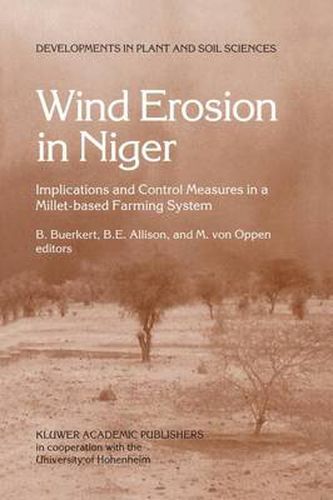Readings Newsletter
Become a Readings Member to make your shopping experience even easier.
Sign in or sign up for free!
You’re not far away from qualifying for FREE standard shipping within Australia
You’ve qualified for FREE standard shipping within Australia
The cart is loading…






This title is printed to order. This book may have been self-published. If so, we cannot guarantee the quality of the content. In the main most books will have gone through the editing process however some may not. We therefore suggest that you be aware of this before ordering this book. If in doubt check either the author or publisher’s details as we are unable to accept any returns unless they are faulty. Please contact us if you have any questions.
The West African Sahel is the transition zone between the Saharadesert in the north of Africa and the more humid Sudanian zones in the south. Although diverse in many ways, the Sahelian countries have the common problem of a fragile agricultural sector. This predicament is mainly caused by low inherent soil fertility, limited and unpredictable rainfall, frequent droughts, and wind erosion that accelerates soil degradation and desertification, compounded by To assure food production in the future, means rapidly growing populations. of declining soil fertility and increasing must be found to offset the trends soil degradation through wind erosion. This is a challenge for agricultural research. Since 1985, the Special Research Program 308 ‘Adapted Farming in West Africa’ at the UniversityofHohenheimin collaboration with the International Crops Research Institute for the Semi-Arid Tropics (ICRISAT) in Niger, has pursued the developmentof agricultural innovations for smallholder farmers in one of the most ecologically fragile regions of the world. The prevention of soil degradation, the restoration and maintenance of soil fertility, and the increase of land and labor productivity are key objectives of this multidisci plinary research program. From the beginning, a major focus of research has been wind erosion.
$9.00 standard shipping within Australia
FREE standard shipping within Australia for orders over $100.00
Express & International shipping calculated at checkout
This title is printed to order. This book may have been self-published. If so, we cannot guarantee the quality of the content. In the main most books will have gone through the editing process however some may not. We therefore suggest that you be aware of this before ordering this book. If in doubt check either the author or publisher’s details as we are unable to accept any returns unless they are faulty. Please contact us if you have any questions.
The West African Sahel is the transition zone between the Saharadesert in the north of Africa and the more humid Sudanian zones in the south. Although diverse in many ways, the Sahelian countries have the common problem of a fragile agricultural sector. This predicament is mainly caused by low inherent soil fertility, limited and unpredictable rainfall, frequent droughts, and wind erosion that accelerates soil degradation and desertification, compounded by To assure food production in the future, means rapidly growing populations. of declining soil fertility and increasing must be found to offset the trends soil degradation through wind erosion. This is a challenge for agricultural research. Since 1985, the Special Research Program 308 ‘Adapted Farming in West Africa’ at the UniversityofHohenheimin collaboration with the International Crops Research Institute for the Semi-Arid Tropics (ICRISAT) in Niger, has pursued the developmentof agricultural innovations for smallholder farmers in one of the most ecologically fragile regions of the world. The prevention of soil degradation, the restoration and maintenance of soil fertility, and the increase of land and labor productivity are key objectives of this multidisci plinary research program. From the beginning, a major focus of research has been wind erosion.